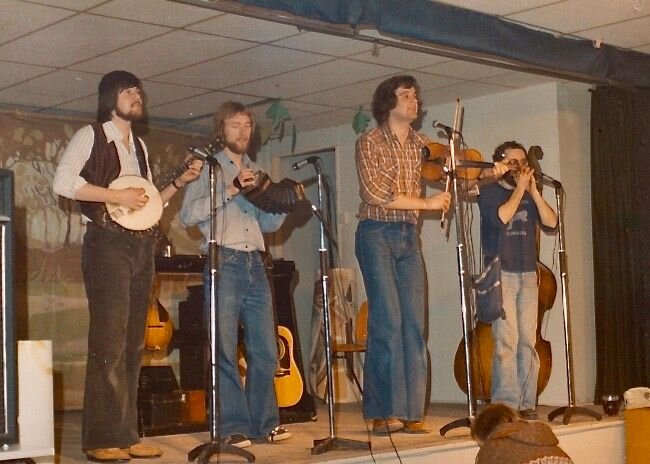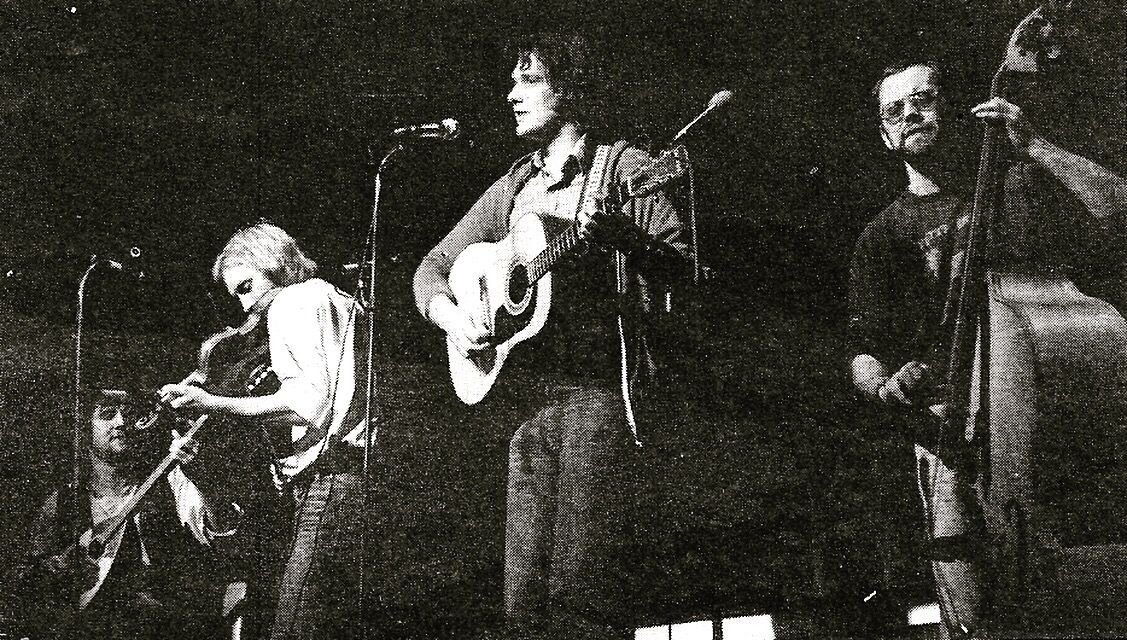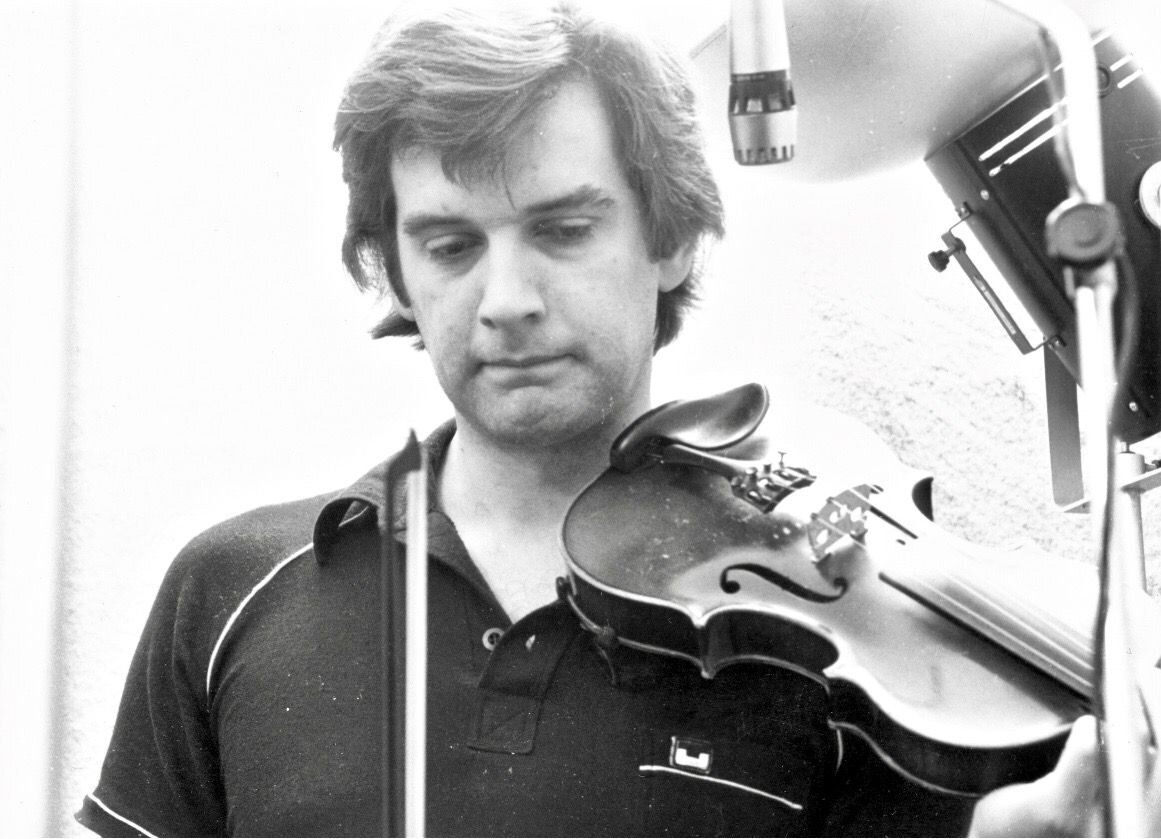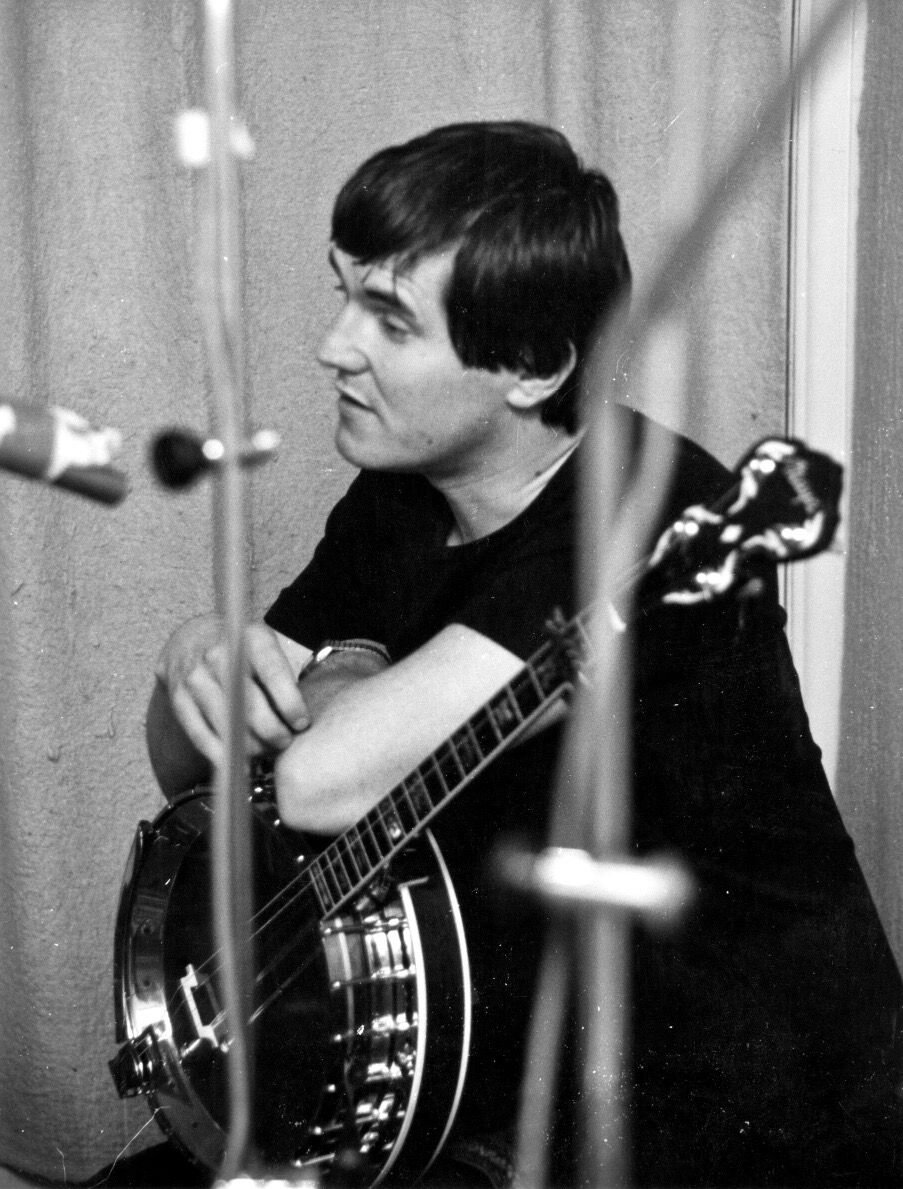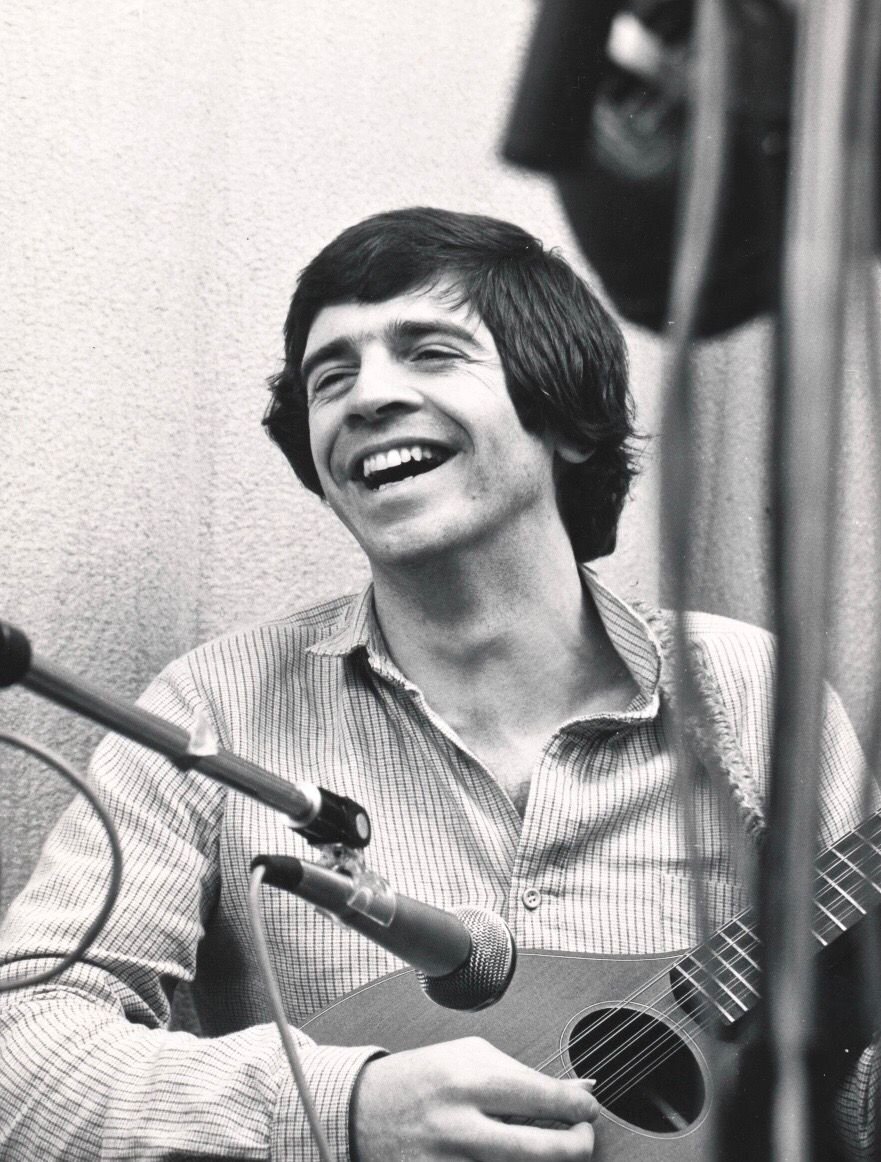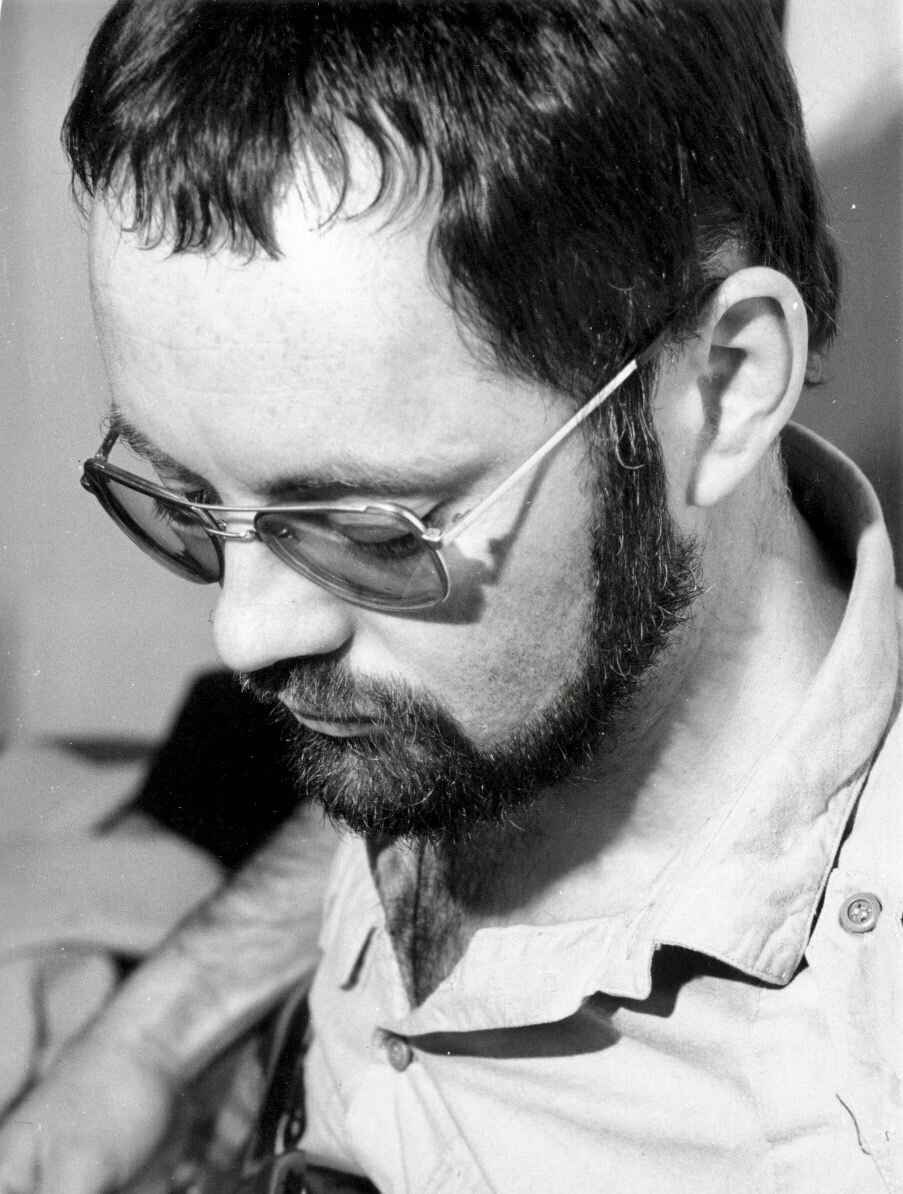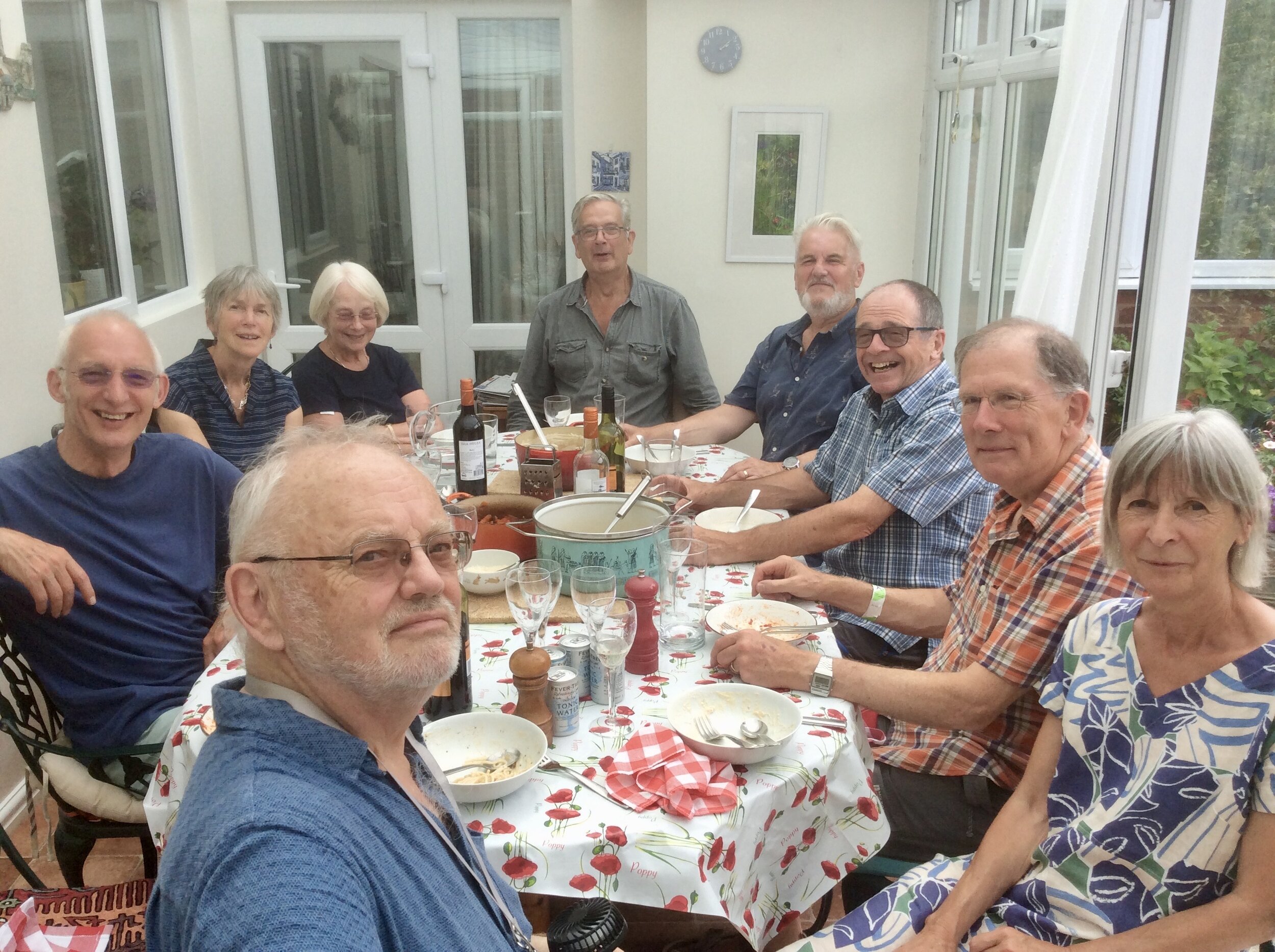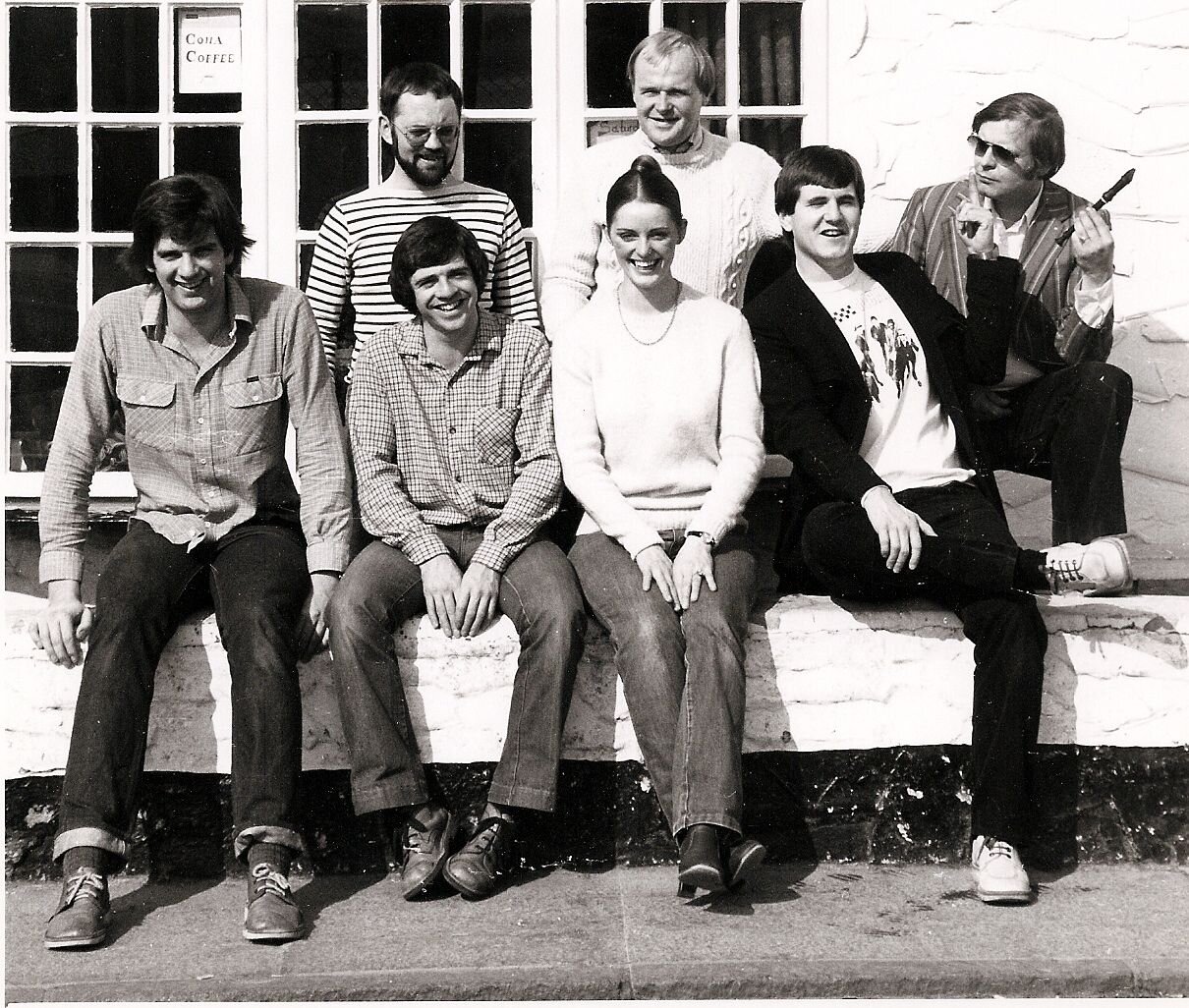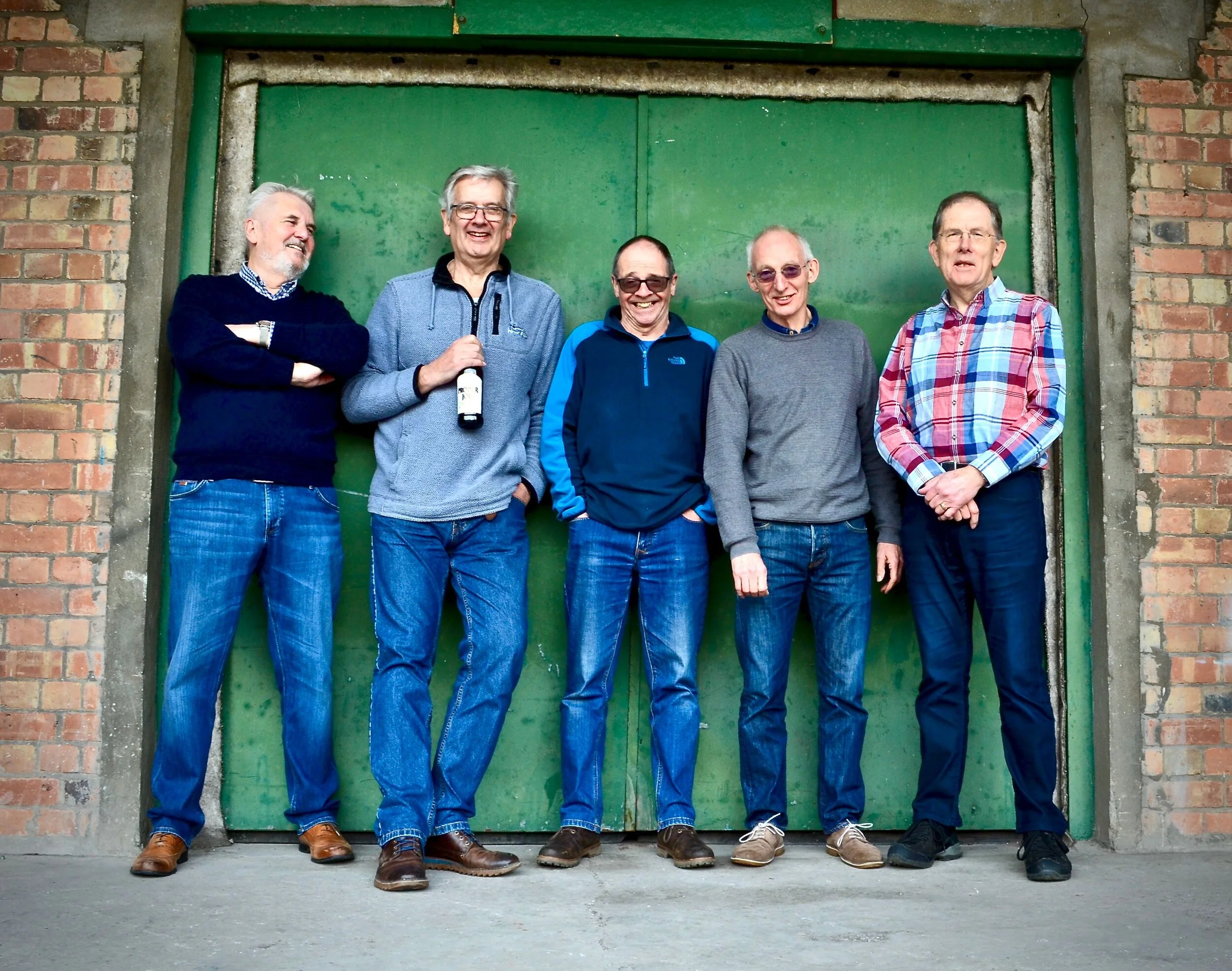In the beginning…
…there was a bunch of young chaps who frequented the Somerville Arms pub in Leamington Spa and one night, enjoying a pint or two and feeling on top of the world, they thought it would be a splendid idea to start a band!
Co-founder of the Somerville Gentlemen’s Singers, Barry White, with Ted and Martin, in the Somerville Arms.
The White Horse pantomime, c.1976. Phil Ferrar, Dan Dorning, Martin “Giant” Cole and Ted Crum. The band was part of the community that emerged from the amazing White Horse Folk Club, resulting in some classic performances with the extended family of singers and musicians that went out as The White Horse Road Show.
The band behind its spiritual home, the legendary Somerville Arms in Leamington Spa.
One of the earliest live performances outside Warwickshire - we think it was at Fylde Folk Festival, c.1976.
The performance that made the band’s reputation as something of a ‘Southern phenomenon’ in the north of England. The Town Hall, Durham City Folk Festival, summer of ‘76.
With the “Fifth Gent’, Pete Ferrar, Phil’s percussive creation, based on Brett Marvin & The Thunderbolts’ ‘lagerphone’, AKA ‘zobstick’. Performing “I’m The Urban Spaceman”. Whatever became of Pete? (Sadly, he was last seen languishing in a skip!)
Summer of ‘76, the beach at Snettisham. The Wash was perfect for water-skiing and for hunting flat fish and foraging for cockles when the tide went out. With Shona McLean and Eric Crimmins. Jem and Eric performed as a duo at the time, called Jericho’s Cunning Stunts (!)
The Queen’s Silver Jubilee, 1977. Busking in Stratford on Avon, performing “Moving Day” in front of the Royal Shakespeare Theatre. Jem was becoming a regular addition to the band, which developed a popular sideline of doing comedy songs and music hall numbers.
The band at Fylde festival. Still stunned by the phenomenal audience reaction. Photo by Larry Gilbert.
Larry “Lazlo” Gilbert, sound engineer extraordinaire, bantering with Ted.
The album, released early in 1980.
The downside of all being multi-instrumentalists is the amount of gear you have to lug about on stage! So, Phil built this music stand for stage work. For festival slots they’d load it up off stage and then carry it onto the stage for the performance. It could be dismantled easily for transport in the trailer. Genius! Sadly, after the band declared a short ‘holiday’ (23 years!) it was recycled!
The Somerville Gentlemen’s Dance Band, with Kate and Andy Gotts (standing) and caller, John Meechan
The lads on the beach at Fylde. Lazlo knew how to take a really good shot. And in those days it was all Kodachrome film, exposure meters, fingers crossed and not knowing if it was a brilliant piece of art or an utter dud until you’d developed it in a dark room. None of this digital stuff, which is for wimps!!!
On the wall, just four of the amazing Martin Cole instruments created for Phil. The cittern (bottom left) he built in the late ’70’s. Also featured: mandocello (bottom right), mandola (top left) and mandolin (top right). Over the years the quality and size of the band’s collection instruments grew considerably, and with it the musicianship and arrangement possibilities developed well beyond humble origins.
The Somerville Gentlemen at Warwick Folk Club, 2016.
With Peter McDonald.
Team lunch Chez Crum. Clockwise - Dan, Lainey Cole, Margaret McDonald, Giant, Phil, Jem, Peter, Jenny Dorning and The Man Himself, The Mighty and Magnificent Edward Tudor.
Adding some polish at the Scout Hut, Harbury.
The day before the concert, ready to rehearse for the first time with The Gentlets.
The stage at the Bridge House Theatre, ready to open the doors for the band’s anniversary concert. The audience was treated to a Gents’ archive slide show as they took their seats and waited for Andrew Sharpe to introduce the band.
Performing Martin’s self-penned song, “Rose of England”.
“Yarmouth Town”. From left - Juliet Thomas, Aiden Adams, Dan, Richard Ferrar, Phil, Jem, Martin, Joe Crum, Rosanna Cole, Elaine Cole, Sue Crum, Ted, Matt Crum, Peter.
The Gents final encore - appropriately the song of farewell “The Parting Glass” with which the band had closed many gigs over the years. It was an emotional moment and looking back even more so, as it was the last time Ted performed with all the guys. He had the last word as they left the stage.
Early Years
To begin with, it was a loose collective which sang a cappella in the pub - Ted Crum, Barry White and Smith (AKA The Smith or The Orrible Smith! who was, as you might expect with a name like that, a very nice guy). They called themselves, naturally enough, The Somerville Gentlemen’s Singers. Now and then, the landlord, John Chater, would join them in song sessions in the pub. As a repertoire took shape the original three-piece began to perform in clubs in the area, alongside folk scene friends such as Polly Bolton and Kevin Dempsey. The repertoire included “The Parting Glass” - which became a constant in all incarnations of the band, as well as highly imaginative arrangements of songs such as “Whose Pigs Are These?” and “Bells of Rhymney”.
Barry White was staunchly traditional, disdaining all forms of instrumentation in folk songs. This was about to change, as two new regulars at the Somerville Arms joined in the singing and brought out of hiding a guitar and other instruments to accompany the songs. Barry was sniffy at first but grudgingly admitted they were “quite good” and Martin Cole and Dan Dorning were drafted into a five-piece version, going by the adventurous moniker, The Somerville Gentlemen’s Band.
Both versions co-existed for a time, but Barry left the SGB (probably not pure enough for him!) and when in 1975 Smith got a job in Manchester, forcing him to leave the group, the lads asked Phil Ferrar to join.
For the next couple of years, this was the line up that worked on new material, always looking for adventurous touches and making use of their combined talent as multi-instrumentalists and exceptional singers. They were blessed with two extraordinary and unique vocalists in Ted and Martin, each very different in style. Martin was a versatile singer-songwriter with a compelling stage presence, and he was already a guitarist of exquisite taste. Ted, with his knowledge of folk song and his experience as a musician, was the heart of the band, with a voice of great power and passion, and he was one of the best harmonica players in the country, even then. Dan could get a tune out of anything he laid hands on: Anglo concertina, English concertina, recorders, fiddle, and he could write four part harmony vocal arrangements, for example his version of “Now Is The Month of Maying”, which was an impressive crowd-pleaser. Phil was a multi-instrumentalist, too - “anything with strings and frets!” Originally a guitarist, then electric bass in a rock band, he was given a mandolin for his 21st birthday (the year Rod Stewart had a hit with “Maggie May”, the song’s mandolin part inspiring him to say “I want one!”). Soon after he got used to the tuning of the mandolin he saw an old Birmingham-made “Windsor” tenor banjo in a junk shop and bought it. Next it was a bouzouki… and the story continues!
Phil had been playing in a band called Riff Raff, with Angus Grant, Ali Bromilow and Jeremy Patterson, which had a residency at the Loony Bin folk club in Shirley. Jeremy’s re-written version of his least favourite song “All Around My Hat” became a comic classic both for Riff Raff and later for the SGB. When the Sunday night residency came to an end because Jem had to return to college, Phil started going to Maggie Coleman’s marvellous White Horse Folk Club in Leamington Spa, and it was there he met The Gents. Phil added bouzouki and mandolin to impromptu arrangements of Ted’s songs on club nights, so when he was invited to join the Gentlemen he slotted into the band, naturally. Phil continued his alliance with Jem Patterson, performing faithful renditions of Cosmotheka songs at parties and family gatherings, and Jem became very much part of the Somerville / White Horse social scene.
Summer of ‘76
By 1975, the band, which had begun as a very creative a cappella ensemble (their foundation in this has always been at the heart of the group), now had the luxury of an abundance of musical instruments to fill the minds of four young musicians and fuel their creativity almost limitlessly. This band was not going to simply trot out standard folk arrangements with every verse and chorus sounding the same as the last, that was for sure! In some songs, every one of them switched instruments mid-song - a bold move with sometimes hilarious consequences, the wrong harmonica picked up, or a guitar in the wrong tuning. But the approach added new sounds to arrangements and the colour palette was impressively diverse:
Martin Cole - vocals, guitar, fiddle, concertina, recorders.
Ted Crum - vocals, harmonica, bass, whistles, recorders.
Dan Dorning - anglo and english concertinas, recorders, fiddle, vocals.
Phil Ferrar - mandolin, bouzouki, , tenor banjo, guitar, vocals.
They worked up a distinctly ‘English’ repertoire. Irish bands and musicians were so incredible - bands like Planxty inspired them - but there was no desire to copy or follow others; they wanted a sound of their very own. So, what developed was a mix of English songs, tunes and ballads, some fine Morris concoctions, and some rollicking music hall songs. The emphasis then, as now, was to entertain the audience and not to be over-serious. The chemistry of the four lads, shaped by hours of being packed together, sardine-like, in a car travelling to gigs, sharing stories, anecdotes and repartee in uncontrollable laughter, transferred to performances and interactions with the audience. Their ‘act’ took shape, but always retained spontaneity, encapsulating the chemistry of the four friends.
In the Great Summer of 1976, the band turned up on-spec at the Durham Folk Festival and after a spot in an early session, were commended by the organisers, who asked them to appear in the main concerts over the rest of the weekend. No one was more surprised than the Gents themselves! But their reputation as a ‘Southern act’ grew and, as a result, the band had the pleasure of being booked by folk clubs and festivals in the North over the next few years, compelling them to drive long distances crammed into a Renault 4, hemmed in by instrument cases, with Ted's double-bass strapped on a roof rack.
It was a truly fabulous summer! Immediately after their triumph at Durham, the band and friends decamped to a caravan in Norfolk and played music around a campfire at night, and fished in the mud for cockles and dabs during the day. They also learned to water-ski. (“We were quite good, actually, though not very elegant!”)
The summer continued to be a proving ground, with bookings mostly in the North to begin with - Fylde Festival among them - and word spread south to other festivals and clubs. Travelling was still a challenge but it’s astonishing the amount of gear you can get into a Renault 4. Ted’s bass was wrapped in a plastic tarp and somehow survived wind, rain, hail and snow, and somehow the band survived, too!
The band teamed up with fine musicians, singers and clog dancers who frequented the White Horse Folk Club and formed a travelling show - The White Horse Road Show. There was something very special about this cooperative concoction. Friendships were formed and developed and became part of the extended family.
Changing gear
Sometime in 1978, Dan told the guys he’d had enough of the travelling and the blur of folk clubs, some of which were, frankly, not worth the unattractive experience of sitting in a box on wheels for hours and hours, even with your best mates. Folk clubs didn’t have the means to advertise in those days - no internet - and there’s nothing more dispiriting than turning up to an audience that’s smaller than the band! They gave it all they could, but sometimes it hardly seemed worth it. So, tired of multiple near-death experiences driving through fog on the M1 in the early hours, having three hours sleep and then trudging off to work, Dan said fond farewells, gave his best wishes and left the band to pursue a more ‘normal’ life.
Dan's leaving left a hole that could not be filled - as well as a splendid fellow, he was/is a very fine musician. Other musicians who knew the differences between an Anglo concertina and an English concertina said how impressed they were at how he could play both brilliantly. But the Gents saw an opportunity to add something different in the way of instrumental possibilities and songwriting to their repertoire and invited Jem Patterson to join.
Jem Patterson - guitar, cittern, mandolin, sticks, bones, triangle, coconuts, vocals
A great wordsmith, Jem had written a take-off of Steeleye Span's 'All Around My Hat' called 'I'm Going To Drown My Cat', which in intervening years has been plundered by wandering singers, going viral long before viral was a thing. On the web there are references to the song being performed at clubs in Memphis and Melbourne, Kansas and Kazakhstan. Jem acted these comedy songs rather than simply singing them, his facial expressions told a story on their own. He proved himself to be a fine singer, too, with a Gent-friendly ear for harmonies. So, he was in!
The band continued to rehearse on Tuesday nights after which they’d retire to the ‘Ville for a pint. Jem blended into much of the existing repertoire, and the band worked hard on new material. The bookings kept coming in, thanks hugely to their Manager, Karen Umpleby, who asserted her tough but fair management style on the band, insisting that if we wanted it badly enough, travelling to Hartlepool on a Friday night, Bournemouth on Saturday, and Fylde on Sunday was what we had to do...don’t complain, suck it up!
In 1979 there were many weekends like that north-south-north weekend. On one occasion, they drove three hours to a gig only to find that Ted had left his bag of harmonicas and whistles on the wall outside his house! Good friend, Andy Gotts, agreed to drive half way to meet him so that he could get back to the gig on time.
It’s not possible to list all the folk clubs and festivals they played at, but a quick rummage through the band’s memory banks retrieved this incomplete list:
Festivals:
Durham City; Sidmouth; Fylde; South Petherton; Billingham; Bromyard; Warwick; Crewe & Nantwich; Towersey; Trowbridge; Winchester.
Folk Clubs:
White Horse (Leamington Spa); Warwick; Bournemouth; Bedford: Grantham; Hull; Bradford (Topic); Hartlepool; Lincoln; Aylesbury; Luton; Dursley; Osmotherly; Blackpool; Durham; Sedbergh; Westhoughton; Bury; Kenilworth; Redcar; Newark; Birmingham (Star).
The gigging made the band. There was a deep love of the music, but it was meeting wonderful people along the way that made it special - all those wonderful people at folk clubs and the organisers who put the lads up overnight, risking being eaten out of house and home by Giant!
They missed Dan - his wit, his story telling, his slightly surreal introductions and interjections on stage and of course his fabulous concertina and wind instrument playing. But the song choice and arrangements continued to flourish, with Martin and Ted going from strength to strength in the vocal department, Jem’s skills on the frets and his ability to rustle up bizarre percussion devices, Phil coming up with unusual arrangements and fresh ideas, and all of the band taking a step up in performance, the band was really buzzing!
Far From Home
In 1979, the band was ready to make an album. They booked a mobile studio and acquired the services of producer, Les Penning, the man who played recorder on many Mike Oldfield records including “Ommadawn”and several singles. We were fortunate in negotiating a perfect location - Barmouth in Wales, where the landlord of the pub on the quay, the most excellent Brian Lynch and his good wife, Yvonne, agreed to give us the use of a holiday apartment in return for playing in the pub - The Last Inn - in the evenings.
By this time the band had bought PA equipment and sound gear and they asked a good friend of theirs - Larry Gilbert - to be their sound engineer. He’s also a fine photographer and clicked away to great effect throughout the Barmouth sojourn, his photos adorning the album gatefold insert.
Outside The Last Inn, Barmouth. 1979. In the centre, the wonderful Brian and Yvonne Lynch, who became great friends of the band. Producer Les Penning on the right, with ubiquitous recorder. Photo by Larry Gilbert.
So began the exciting process of putting down the best of our repertoire on tape. Many friends visited and stayed to join in with the sessions in the pub. The Gents laid down tracks during the day, using an apartment bedroom as the recording booth, suitably stuffed with mattresses and hung blankets, and linked it all to the studio in the caravan outside the apartment. Les had a video camera and two-way audio to communicate with the band in the studio. Mostly, songs were recorded as a collective live performance, but with some overdubs on tracks like “Lovely Joan” and the “Mitchill’s Galliard” tune set recorded as separate parts and later edited together.
The boys wanted drums on “Oyster Girl” and pleaded with Les to see what he could do. A quick phone call and 24 hours later and heavy metal drummer, Robbie Dobson (The Enid; Hawkwind) turned up and nailed it in ten minutes, literally. Phil added autoharp on one track and bowed psaltery on another, dropping in extra mandolin parts on some tracks, while Les put the band’s recorder playing in the shade, masterfully adding sopranino recorder flourishes here and there.
Most evenings were spent in The Last Inn. The lads would eat, get the drinks in and then the singing would start. The place was rammed, not least with the Barmouth Lifeboat Crew, who were fine singers. One night they took the band to Barmouth Yacht Club, resulting in serious hangovers next day.
On the song “Yarmouth Town”, which has a strong refrain and is great for a rollocking good singalong , the guys decided they wanted the Lifeboat crew singing the chorus. Les, by this time long-suffering, gave in and they carted the tape recorders and kit down to the pub one evening and by monitoring the recorded track with headphones, sang the verses and Les recorded the whole pub singing on the choruses. You can hear a few high-spirited Welsh voices in the closing fade.
The Gents in Barmouth, summer 1979.
The album was mixed in Leamington Spa and, after a hiatus with Plant Life Records, it was launched on the band’s own label in 1980.
The gigs were coming thick and fast. So that the band could use their own PA with Larry (“Lazlo”) at the helm, the chaps decided to build a trailer (buying a ready-made one was too expensive). It was built on a flatbed design and totally encased in ply with a thick tarpaulin - finally they got the double bass off the roof rack!
The magical moments kept coming. The wonderful Alan Bell booked them for Fylde Festival, playing on the main concert stage immediately before Nic Jones. The audience gave them a standing ovation and extended applause. When they left the stage, Nic was waiting to go on - “You bastards! I’ve got to follow that!” he said, with a broad grin. Needless to say he blew away the audience with his stunning performance and the band’s humility was preserved.
The band was booked for Towersey Folk Festival and went down a storm. So much so, that when the star act got stuck in transit somewhere the organisers asked us to step in and headline the final concert in the grand marquee. The lads, chuffed to bits, threw themselves into the concert, actually running onto the stage, and the audience of 2,000 plus loved it! It was a grandstand event for the band. Towards the end of the set, the actual headliners, the Welsh folk supergroup Ar Log, arrived by helicopter (!) and finished the festival with a short, much truncated affair. The band were too busy celebrating to take much notice!
Then in 1981, they were booked for Sidmouth Folk Festival. A film crew wanted to film a concert in the Beach Store, featuring the Somerville Gentlemen’s Band. The film was broadcast on BBC2 in October 1981 and the Somerville’s had a healthy dose of the running time, their tune set “Far From Home / Speed The Plough” featured as the film’s opening soundtrack. Martin managed to acquire a rough-cut edit from the film crew and you can see them performing selections on the band’s YouTube channel (“Far From Home / Speed The Plough”, “Lovely Joan”, and “Country Carrier”). Apologies for the grainy quality!
The early ‘80’s saw a resurgence of ceilidhs and barn dances, so the Somerville Gentlemen’s Dance Band was born. Drafting in Kate Gotts on keyboards and Andy Gotts on electric guitar enabled the band to spread out and try new arrangements. Ted played electric bass as well as harmonica (close-miked to give a real bluesy feel) and melodeon. Phil’s Fender Jazzmaster, suitably re-tuned to fit with tenor banjo stylings, was put to use in many tune sets. Jem switched almost exclusively to drums and percussion, investing in a kit including Roto-Toms and temple blocks, of all things! The overall effect ranged from a gently rolling sedan one minute, to a mad, supercharged evil-sounding hot rod the next! It was fun to dance to, fun to listen to, interesting to watch, and a lot of fun being in the band. We asked John Meechan to call as often as we could get him - he understood and encouraged our humour and style of playing. Good old John. Some great nights, including fund-raisers for the very first Warwick Folk Festival in 1980, at which the Gents did a set on a bill with June Tabor and Martin Simpson. It was to be one of the last big gigs they did, for a while at least - life got in the way - kids, jobs, moves to different parts of the country. It had to happen eventually.
The 23-Year Holiday
The band never broke up. They just took a long holiday and forgot to say when they’d be back. There were a few gigs scattered here and there for a couple of years, but it was difficult to maintain - Phil had moved to Yorkshire, Jem to Cirencester and, in 1985, Martin left his job to set up Martin Cole Guitars. He’d been making guitars since school age and now he was ready to devote his working life to crafting quality guitars, mandolins and stringy-things for discerning musicians
In 1996, Martin and his wife Lainey made the bold decision of moving his studio and their home to Bude in Cornwall. His reputation as a Luthier grew and many musicians made the long journey to Cornwall to commission their own, including luminaries such as Steve Tilston, Simon Mayor, Hamish Bayne, Bram Taylor, Ian Bruce, Ewan McLennan, Keith Donnelly, Alan Bolt and Katherine Fear. He also worked on some of Gordon Giltrap’s guitars.
Phil joined a full-on electric ceilidh band in Yorkshire, called Moonshine Still, boasting some very fine musicians. Jem played in ceilidh bands and continued to perform comedy songs in various settings. Ted formed Steamchicken with Andrew Sharpe, eventually growing to include the highly talented young Crums - Matt and Joe - and developing the sound into a folk-jazz blend that was a hit at festivals all over the country through the next 20 years and beyond.
In 2010, Martin pitched the idea of a reunion, but no one could find Phil’s contact details - he’d been submerged in a business career, eventually starting his own business, and hadn’t touched an instrument for ten years. Martin eventually tracked him down, by spotting his daughter’s Facebook page - Ferrar being a fairly rare name, he though Juliet was probably Phil’s daughter - and called him to suggest the reunion. Phil got his instruments out of storage to rehearse and the reunion - a ceilidh and a song set - was a huge success.
Two significant developments resulted from the reunion. First, they were booked for the 30th Warwick Folk Festival (the last time the band had played there was at the inaugural festival). Second, Phil was now living in Stratford on Avon, easy distance from Ted in Harbury and Jem near Daventry. So, naturally, they decided to continue as a trio, rehearsing and gigging around the area, in folk clubs snd the occasional festival.
And Then There Were Three…
The Somerville Gentlemen continued for the next eight years. The song arrangements were carefully created to suit a trio and although Martin was missed the band worked hard to produce a cohesive sound and repertoire that worked. Based on Phil and Jem’s past forays into comedy song writing, the three of them composed two classic songs - “Crassanova” and “Country Banker” - which won 1st and 2nd prize respectively in a comedy song competition. Both are available on the Somerville Gentlemen YouTube site. For “Country Banker” they enlisted Phil’s son Richard and his wife Rachel to direct and film a video, which follows the storyline of the song, in locations including The Somerville Arms and sites around Harbury village. There are several 3-Gents creations on the YouTube channel - check it out. There’s also a really good BBC Radio Oxford recording from 1981 of the band performing “ A Farmer’s Toast” featuring many stills of the band. And you’ll also find the story of Jem’s “I’m Going To Drown My Cat"!” - a parody of Steeleye Span’s “All Around My Hat”.
Meanwhile, Martin was busy in various bands including a superb bluegrass band and a trio, in which he could stretch out and perform self-penned songs. He was also busy during the day, making and repairing instruments and giving guitar lessons. He kept in touch with Dan and Phil exchanged the odd email with him. Dan had taken up the saxophone and was involved in a variety of ensembles, moving into jazz and classical music. The folk world was a million miles away!
The three performed fairly frequently at the wonderful Harbury Folk Club, a truly great folk club. No paid guests, no price for admission, always chockablock with good singers and musicians. The club was founded in 1984 by the supremely talented Peter McDonald, an engaging singer and superb musician. Ted and his wife Sue were regulars, doing their share of hosting. Peter also established the Harbury Folk Club Choir and the Harbury Folk Orchestra. He never had a free moment!
New Beginnings, New Challenges
One night the Gents were performing at a local folk club and Peter McDonald turned up to do a couple of songs. He was so good, and the boys were most impressed. In the interval, Phil drew up a chair next to Peter and said “I don’t suppose you have any spare time in your incredibly busy schedule to manage a collaboration with The Gents?” It was a tentative question, thrown out there just to see if there was the slightest interest or not. Peter replied without hesitation that he would like that very much.
At the first rehearsal in 2018, Peter admitted that he’d been a fan of the Somerville Gentlemen’s Band since the mid-70’s, so there was no way he was going to pass on the chance to work with the group. And after a couple of rehearsals it was obvious the Gents felt the same. So, the band was a quartet again!
Peter McDonald - vocals, piano, guitar, mandolin, accordion, melodeon, bass ukulele.
Sparked by the resurgence of creativity in the band, Phil woke one summer’s morning in 2018 with a dream… a seemingly crazy idea. Next year, 2019, was the 40th Anniversary of the making of “Far From Home”. Wouldn’t it be brilliant to get the ENTIRE band of Gentlemen including the new Gent, Peter, back together for a celebratory concert?
Ted, Jem and Peter liked the idea, although no one, Phil included, believed it would happen. So, Phil called Martin and sounded him out. The words were hardly out of his mouth before The Giant, he say “Yes!” Then Phil phoned Dan, thinking this is such a long shot! But Dan was immediately interested and said “count me in!” First hurdle done, but there were many questions to be answered, many problems to be overcome. Where / how would we rehearse? What would be our set list? Where would we hold this concert? How much would it all cost? And who would want to come?!
The six Gents had a Zoom call to catch up and discuss all these matters. It was abundantly clear from the outset that everyone was excited at the prospect and under no illusion how challenging it would be to pull it off. Phil openly confessed that it could be the last time we’d all play together.
Band rehearsals were in a studio in Bristol, roughly midway between the northern and southern based band members, Dan living in Chichester. They worked on some of the classics from the 70’s and the ideas kept fizzing and sparking around the rehearsal studio for new songs and arrangements. It was an utterly and totally joyful experience, not least simply because the Gentlemen friends were back together again making music. Especially so, given Dan’s 42 year absence, returning armed with saxophones of all things, and the new chemistry created with the addition of Peter and the extra colour he brought to the sound palette. The addition of saxophones - soprano, alto and baritone - and piano changed the dynamics and whole feel of most of the material. It was like a completely new band.
Watch out, they’re back!!
40 Years
The band performed at the very first Warwick Folk Festival, and again at the 30th anniversary. Now they were booked for the 40th. The venue was the excellent Bridge House Theatre. Their set concluded the Saturday afternoon concert and was received by an appreciative audience, and for those who had long memories of them, with much emotion. It may have been 40 years, but for the band it was a first - a new line-up, some new songs and ambitious arrangements - The Gents were back!
“Nice to be back!”
All the work paid off and the band was in great shape, but there was more work to be done in the two months leading to the 40th Anniversary concert celebrating the making of “Far From Home”. They had a whole evening’s entertainment to fill and so much to organise. Rehearsals continued by exchange of mp3’s, such as Martin’s solo recording of “Sailing to Philadelphia” passed to Phil, who added electric guitar, then to Dan who grafted on a saxophone part.
Planning the set list the band decided on a classic Gents first half but wanted to do something different in the second half. It was an ambitious undertaking. involving seven singers and musicians that would not be able to rehearse with the full band until the day before the concert. The “Gentlets” were Ted’s wife Sue and their sons, Matt and Joe; Lainey, Martin’s wife and their daughter Rosanna; and Phil’s daughter Juliet and fellow Brentwood Operatics singer Aiden Adams.
Bridge House Theatre concert
The band’s 40th Anniversary concert was on September 21st 2019, proudly featuring the original Gents, and Peter McDonald. Long time Steamchicken impresario and friend of the band, Andrew Sharpe, agreed to MC (thanks Andrew!). The second half of the show featured, in various combinations, “The Gentlets”:
Matt Crum - keyboards, melodeon, saxophone.
Joe Crum - drums
Juliet Ferrar - vocals, ukulele
Aiden Adams - vocals, guitar
Rosanna Cole - vocals
Lainey Cole - vocals
Sue Crum - vocals
The full concert was recorded and filmed using an iPhone. All of the songs are featured on YouTube:
It was a fabulous night and an amazing audience of friends of the band, old and new, made it a night to remember. The show was always ambitious in scope but the band was in good shape and their glee at being on stage together with this incredibly warm audience made it a priceless, unforgettable experience for the performers. As Martin said to the band before they went on stage, “Enjoy it!” and this they certainly did!
The final encore was the band’s song of farewell - “The Parting Glass”. It was a tradition going back to the 70’s that the band finished with this a cappella song and it was the last song on “Far From Home”. Sadly, the poignancy of this moment was ultimately cast into a new light as it turned out to be the last time the six Gents performed together. Ted’s health declined and tragically he succumbed to Coronavirus six months later.
New Beginnings
The four Gents - Ted, Peter, Jem and Phil - continued to rehearse in the months after the concert, learning new material boosted by the enthusiasm arising from the anniversary show. On the night before Lockdown was officially announced, the lads had a rehearsal at Ted and Sue’s house. They reckoned it would be the last chance for some time. How true. Within three days all four Gents and Sue started exhibiting Covid-19 symptoms. Phil and Ted were admitted to hospital. Phil’s bout was kinder, in that it didn’t affect his breathing. Ted was less fortunate and died after four days in ICU. The nurses contacted Sue, who because of the Lockdown rules could not be with Ted in hospital, and using iPads she was able to share a brief time with Ted before he passed.
The Lockdown meant that Sue could only be joined by sons Matt and Joe, and her brother Jon. At the time of the funeral the rest of the band shared an hour on Zoom, raising a ‘parting glass’ to Ted, as he would have wanted.
It took over six weeks for Phil, Jem and Peter to get back to something resembling normal health after the virus. But more than that even, they were desperately sad about Ted’s passing.
The guys discussed whether or not to continue the band, as a five-piece and in the Midlands as a three-piece. The overwhelming feeling from each band member was to continue but wanted to be sure this would have Sue’s blessing. Sue was very clear on this, saying, “Ted would have wanted it, in fact he’d be really angry with you all if you didn’t!”
Spurred on by the idea of a concert in Harbury in April 2021, the guys started to figure out what new material and arrangements they could rehearse, and, given the Lockdown, exactly how they would achieve this. The story continues…
Somerville Gentlemen’s Band (5-piece version):
Martin Cole - vocals, guitars, fiddle.
Dan Dorning - vocals, soprano, alto and baritone saxophones, English concertina.
Somerville Gentlemen (3-piece version):
Phil Ferrar - vocals, guitars, mandolin, mandola, mandocello, bouzouki, tenor banjo, bass.
Jem Patterson - vocals, guitars, mandola, cittern, percussion.
Peter McDonald - vocals, piano, guitar, mandolin, accordion, melodeon, bass ukulele.
Gentlemen, a little more decorum please!!


